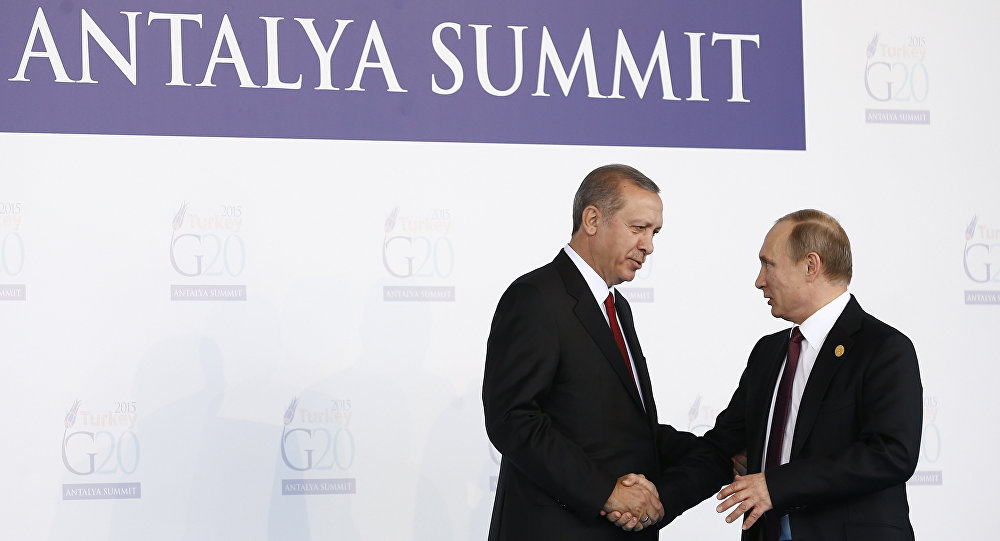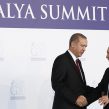
Turkey and Russia Strive to Mend Strained Relations During G20 Summit
Publication: Eurasia Daily Monitor Volume: 12 Issue: 212
By:

This past week (November 15–16), in the Mediterranean coastal city of Antalya, Turkey hosted the G20 summit for the first time. Though normally devoted to high-level political discussions of global economic issues, the recent string of terrorist attacks in Paris (November 13) and elsewhere induced this year’s gathering of G20 leaders to debate how to respond to the growing threat posed by the Islamic State group. (Hurriyet Daily News, November 14).
The Turkish government all along wished to raise at the G20 summit what it considers the most pressing issue for its security in recent years—the ongoing Syrian crisis. And while Turkey did, indeed, use the summit as a venue to discuss and seek a political resolution to the Syrian civil war, it also deliberated important energy-related issues with Russia on the sidelines of the G20 (T24, November 15).
In the weeks and months leading up to the summit in Antalya, Turkish-Russian relations were rocked by a number of serious disagreements in the security and energy spheres. On September 30, Russia’s decision to initiate military air strikes in support of President Bashar al-Assad’s regime in Syria strained relations between Ankara and Moscow, which already sharply diverged on the subject of how to deal with the Syrian war (Al Jazeera Turk, September 30). Relations between the two countries further deteriorated in early October, after Russian jets violated Turkish airspace several times during their bombing runs (CNN Turk, October 7).
In addition, starting in September, growing disputes arose between Turkey and Russia in the energy sector. Foremost, the bilateral disagreements encompassed the Russian-proposed Turkish Stream natural gas pipeline project, first put forth by President Vladimir Putin, in December 2014, as an alternative to the failed South Stream pipeline. The troubled negotiations on Turkish Stream have already resulted in Russia’s natural gas monopoly Gazprom announcing, on October 6, that the capacity for the proposed pipeline would be reduced from 63 billion cubic meters (bcm) per year, down to 32 bcm (Milliyet October 6).
Much of the disagreement has hinged on flouted Russian pledges to offer a discount to Turkey for natural gas. On February 27, Gazprom announced a 10.25 percent discount on natural gas purchased by Turkey’s state-owned pipeline company BOTAŞ (Milliyet, February 27). However, Gazprom took no action on the discount after February. Therefore, in October, Turkey made use of its right to bring the case to the International Arbitration Court, based on a clause in the agreement with the Russian energy giant (Anadolu Agency, October 27).
Some Turkish analysts have explicitly argued that Russia’s failure to move forward on the promised 10.25 percent gas price reduction has prevented the Turkish Stream agreement from being signed. Since reaching a deal on the price of Russian gas transmitted to Turkey by the West Stream pipeline (which transits Ukraine and then passes south to Thrace), Ankara wants the Turkish Stream agreement to be evaluated separately. Moscow, however, favors discussing the 10.25 percent reduction in gas prices to be paired with bilateral negotiations over the Turkish Stream project. Turkey’s aim, in this case, has been to bring different terms to the negotiating table concerning the new pipeline. In particular, Turkey wants to preclude a “take or pay” clause from being included in the agreement over Turkish Stream (see EDM, September 22).
Both sides had hoped that Putin and his Turkish counterpart, President Recep Tayyip Erdoğan, would be able to discuss and come to some agreement on all of these regional security and energy issues during the G20 summit in Antalya. On November 15, the two leaders held a meeting on the sidelines of the summit, which lasted close to 55 minutes. The official statement from the Turkish president’s office reads as follows: “During the one-on-one meeting between President Erdoğan and Russian Federation President Putin, the two leaders exchanged their views on regional issues, especially Syria.” (Habertürk, November 16). However, it soon became evident that the meeting produced no tangible results.
Instead, the Putin-Erdoğan meeting apparently revolved around planning to hold the Turkey-Russia High-Level Strategic Cooperation Council (UDIK), in Kazan, Russia, on December 15 (Tccb.gov.tr, November 15). Obviously, this indicates that there are still considerable differences of opinion between the two governments on Syria and gas sales. But in addition, the two sides consciously deferred further discussions on these highly sensitive subjects until after the formation of a new Turkish government, which is expected to be formed on November 18, by the heretofore ruling Justice and Development Party (AKP), under the leadership of Ahmet Davutoğlu (Habertürk November 16).
Nonetheless, Vladimir Putin did send a significant message regarding Russian-Turkish relations in the energy sector. Notably, he stated that Turkey intends to purchase more natural gas from Russia. This suggests that if an agreement is reached for Turkey to buy more gas from Russia, the promised 10.25 percent discount will likely be applied from 2016 onwards. On the issue of Syria, meanwhile, Putin noted that Russia’s and Syria’s positions have now moved closer to each other, and the two governments were able to find some “common ground” (Haberler.com, November 19). An interesting statement from Turkey’s Minister of Foreign Affairs Feridun Sinirlioglu, reads: “We received no reaction from the Russian side when we expressed that al-Assad should not stay in power” (Cihan, November 18).
It is expected that both the topics of energy partnership and the Syrian issue will be revisited in Kazan, on December 15, when Erdoğan travels there for the UDIK meeting (Sputnik News, October 15). The two governments’ differences of opinion over Syria and al-Assad will probably persist. But as hinted by Putin in Antalya, it seems highly likely that Turkey will receive a discount on future purchases of natural gas. It must be said, however, that this outcome will not be particularly positive in the context of Turkey’s diversification strategy for energy imports. Buying greater volumes of Russian gas can only result in further limiting Ankara’s capabilities for maneuver on the international stage.




